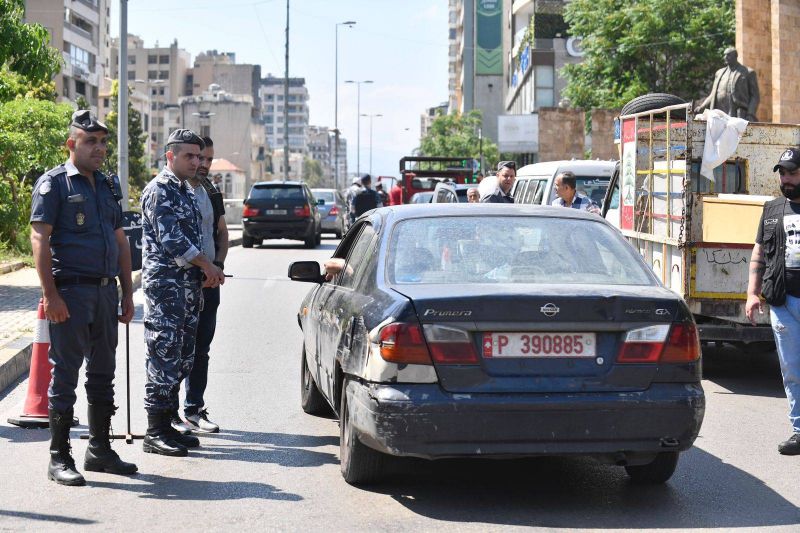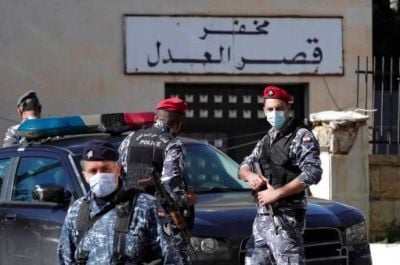
Security forces in the southern suburbs of Beirut during the implementation of the security plan. (Credit: Husam Chbaro/Annahar)
BEIRUT — A new security plan let by the Internal Security Forces (ISF) and implemented on May 15 in Beirut and its suburbs, has sparked recent controversy in the country.
The ISF's General Directorate instructed its units to deploy a maximum number of security patrols and set up checkpoints at various times around Beirut, with the aim of "maintaining security and order" and discouraging the operation of illegal motorcycles and vehicles. Areas affected by the new order include Achrafieh, the southern suburbs and Baabda. The ISF backed its move by claiming that statistics show illegal vehicles are likely to be used in crime. These heightened security measures will be implemented until at least May 24.
L'Orient Today was unable to reach the Internal Security Forces to assess the first week of the plan's implementation, but the outgoing Interior Minister, Bassam Mawlawi, stated on Wednesday evening during a television interview that the police had seized 1,654 mopeds that were not in compliance. This plan is "necessary and requested by all Lebanese to ensure their safety," as well as that of the tourists expected over the summer, added Mr. Mawlawi. According to him, the plan mainly causes reluctance "among outlaws."
'The security plan has some gaps'
The plan was met with some resistance, particularly in Beirut's southern suburbs. On Saturday, individuals who had their motorcycles confiscated protested the measures by burning tires and blocking roads in front of the Mraijeh Police Station.
"Enforce the law on the big heads of state first, then come after us," protesters chanted. Mawlawi defended himself on LBC, asserting that the police "did not enter with machine guns, neither in the southern suburbs nor elsewhere."
“We stand with the state and we are all for implementing a security plan, however we believe that the current plan has some gaps,” Maen Khalil, head of the Ghobeiry municipality, told L’Orient Today.
“The Nafaa is still closed, almost two years later, for citizens in Lebanon who want to obtain a license to drive their motorcycle, so when the current security plan is implemented, the state should take into account that this person who is driving a motorcycle without a license is not trying to break the law,” Khalil explained.
Nafaa is one of Beirut's vehicle registration centers. It has been closed for several months now due to a corruption scandal that led to the arrest of numerous employees. Although it theoretically reopened in September 2023, it has been operating with a very limited capacity, and there are lengthy delays and backlogs when it comes to processing vehicle and driver registration paperwork.
"Why punish them?"
"I worked for many months to be able to buy a motorcycle so I could work as a delivery person for a clothing store, but it was confiscated. This motorcycle was my only source of income. They should open the Nafaa first, and then I will register my motorcycle," complains Adam*, a resident of Haret Hreik.
Bassam Mawlawi responded on Wednesday evening, saying, "The Nafaa is open to everyone even during the weekends, and within a maximum of two months, the Lebanese will be able to complete their procedures electronically."
"Some students go to university by motorcycle because it is an affordable means of transportation, but they cannot obtain a permit because the state does not issue them. Why should they be punished?" asks Maan Khalil. The official nonetheless supports the state taking "all necessary measures against those who break the law and setting up checkpoints to stop troublemakers."
“We have some young university students who graduated two years ago for example from high school, who want to go to university on their motorcycles because it’s an affordable method of transportation but are unable to obtain a license, because the state hasn’t been issuing them, so why should I punish them?” Khalil asked.
However Khalil insisted that he supports the state taking “all necessary measures against those that are breaking the law and setting up checkpoints to capture the thugs.”
“Several reforms need to be made to this plan: first of all the registration fees for vehicles is very high, lack of reliable public transport in the country also causes citizens to search for other alternatives. Some citizens who have their children in public schools take their kids to and from school on the motorcycle and can’t afford any other method for financial reasons. When the state does not provide transportation for public school students it becomes common for a person to see a father and three kids with their schools bags on the motorcycle, with their safety at stake,” he continued.
"I can't spare hundreds of dollars to register my motorcycle"
"I'm the eldest in my family and on top of paying for my university fees, I help pay for my sister's school," Ali Kourani told L'Orient Today after his motorcycle was confiscated on Wednesday.
"I'm barely making ends meet and I can't spare hundreds of dollars to register the motorcycle that was paid for by my brother who lives in Oman." Kourani shares the motorcycle with his father and has used it to commute to university.
Kourani isn't the only one to have his motorcycle confiscated. His friend, Moussa Hamieh, said he tried to "make a conversation with the officer that was confiscating" his bike, only to be " violently pushed."
According to several local media outlets, the outgoing Prime Minister, Najib Mikati, and the head of Hezbollah's Liaison and Coordination Unit, Wafic Safa, reportedly discussed the new security plan. The latter allegedly asked Mr. Mikati to reverse the implementation of the security plan. However, a government source denied these reports to our publication. "There is absolutely no truth to these rumors. Interior Minister Bassam Mawlawi is responsible for this matter and gives the necessary directives; the Prime Minister is not involved in this plan," assured the source.
*Names have been changed to respect personal privacy.
